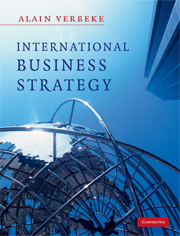Book contents
- Frontmatter
- Contents
- List of figures
- List of case studies
- About the author
- Foreword
- Acknowledgements
- List of abbreviations
- Walkthrough
- Introduction and overview of the book's framework
- Part I Core concepts
- 1 Conceptual foundations of international business strategy
- 2 The critical role of firm-specific advantages (FSAs)
- 3 The nature of home country location advantages
- 4 The problem with host country location advantages
- 5 Combining firm-specific advantages and location advantages in a multinational network
- Part II Functional issues
- Part III Dynamics of global strategy
- Conclusion. The true foundations of global corporate success
- Appendix: Suggested additional readings
- Index
5 - Combining firm-specific advantages and location advantages in a multinational network
from Part I - Core concepts
- Frontmatter
- Contents
- List of figures
- List of case studies
- About the author
- Foreword
- Acknowledgements
- List of abbreviations
- Walkthrough
- Introduction and overview of the book's framework
- Part I Core concepts
- 1 Conceptual foundations of international business strategy
- 2 The critical role of firm-specific advantages (FSAs)
- 3 The nature of home country location advantages
- 4 The problem with host country location advantages
- 5 Combining firm-specific advantages and location advantages in a multinational network
- Part II Functional issues
- Part III Dynamics of global strategy
- Conclusion. The true foundations of global corporate success
- Appendix: Suggested additional readings
- Index
Summary
This chapter explores Bartlett and Ghoshal's idea that large MNEs are making a mistake when they adopt the two simplifying strategies of homogenization (treating all their subsidiaries the same) and centralization (making all their strategic decisions at central headquarters). According to Bartlett and Ghoshal, this is poor strategy: by selectively decentralizing elements of strategic decision making and control, these companies could instead optimize the deployment and exploitation of their present FSAs and support the development of new FSAs in their multinational subsidiary network. Bartlett and Ghoshal offer a model that helps senior corporate managers differentiate among their subsidiaries and decide which subsidiaries should do more than merely implement centrally determined strategy. These ideas will be examined and then criticized using the framework presented in Chapter 1.
Significance
In 1986, Chris Bartlett and Sumantra Ghoshal wrote an important article in HBR on how MNEs should manage their subsidiary network. The substance of this paper was included three years later in their now classic book on the socalled ‘transnational solution’. The paper discussed here is actually the most important part of the book, as it contains a practical tool for senior managers to allocate specific roles to subsidiaries.
The authors suggest that many MNEs mistakenly view host country subsidiaries simply as recipients and distributors of company knowledge and products. These MNEs do not recognize their subsidiaries’ potential to develop unique strengths in their own right and to augment further the MNE's existing FSA bundles.
- Type
- Chapter
- Information
- International Business StrategyRethinking the Foundations of Global Corporate Success, pp. 151 - 174Publisher: Cambridge University PressPrint publication year: 2009



